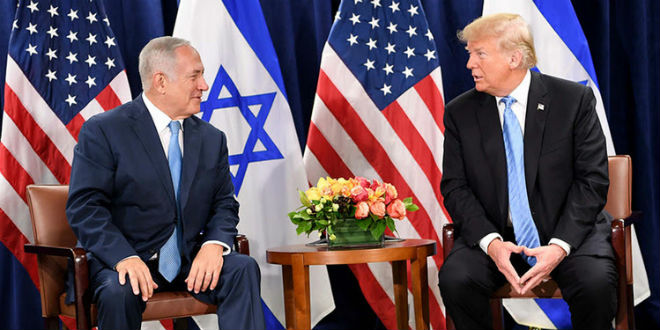On Sunday, a new Likud Party advertisement generated a fair amount of attention in the Israeli press. On the three of the four sides of the party’s Tel Aviv headquarters, banners hang 10 stories down the length of the 200-foot-high edifice depicting Israeli Prime Minister Benjamin Netanyahu shaking hands with President Donald Trump, Russian President Vladimir Putin and Indian Prime Minister Narendra Modi. The posters are included with the tagline: “Netanyahu: A Different League.”
The Likud needs to remind Israeli voters who might otherwise be obsessed with the prime minister’s scandals, as well as the intense political rivalries that are forcing them to the polls in September for the second time in five months, to look beyond domestic considerations. The banners are a reminder that Netanyahu is a world figure who has established solid relationships with the players in the big leagues of international diplomacy.
Part of that has to do with Netanyahu’s skillful exploitation of the fears that Sunni Arab states have of Iran. He’s also been the beneficiary of the transition from President Barack Obama to Trump, moving from a former leader who thought he should save the Jewish state “from itself” to the current president, who has been more favorable to Israel than any of his predecessors. But the prime minister’s efforts to keep the lines of communication open with Russia and to take advantage of the changing political climate in India are also important.
There are two other ways of looking at the banners and the substance of the Likud campaign. One is to criticize the prime minister’s friendships with Trump, Putin and Modi. The other is to exaggerate the extent to which Netanyahu’s diplomatic successes provide Israel with more diplomatic leeway to enable it to go its own way, with or without American acquiescence. Both are mistaken.
The fact that Netanyahu is seeking to tie himself (and Israel) to three figures widely reviled in the international community has provided fodder for Israel’s opposition to claim that the prime minister is part of a new class of global authoritarians.
The effort by Netanyahu’s opponents to tear down his relationship with the country’s sole superpower ally is political malpractice. Trump may be despised by about half of the American public, especially by most American Jews, but he’s very popular in Israel because of his friendship for the Jewish state and his willingness to defy the foreign-policy establishment. He has declared Jerusalem as Israel’s official capital, moved the U.S. embassy from Tel Aviv to Jerusalem, recognized Israeli sovereignty over the Golan Heights, and maintains a tough attitude towards the Palestinian Authority and Iran.
Just as foolish is any criticism directed at Netanyahu for seeking closer ties with Putin, who is a genuine tyrant. That he is friendly to the Russian Jewish community doesn’t make up for the fact that he is a threat to both the United States and other democratic governments.
Still, Netanyahu has no choice but to cultivate relations with Moscow—and not just because some Israeli voters from the former Soviet Union like the idea. Thanks to Obama’s decision to punt the civil war in Syria to the Russians and his appeasement of Iran, Putin’s Russia is also a Middle East power with troops and aircraft stationed next door in Syria. Russia’s acquiescence to Israel’s freedom of action against Iranian and Hezbollah terrorist forces in Syria and Lebanon is essential to the nation’s security.
As for Netanyahu’s embrace of Modi, the idea that Israel should refrain from doing everything it its power to convince the Indians to think of the Jewish state as a natural ally is absurd. The attitude of Modi’s nationalist Hindu Bharatiya Janata Party towards his country’s Muslim minority remains problematic. But his is the first Indian government that understands that the two non-Muslim dominated democracies have far more in common than that which divides them. India’s newfound willingness to not let the Muslim world dictate its policies towards Israel is something Netanyahu must exploit.
There is another troubling aspect of this debate that needs to be discussed.
As with Israel’s flirtation with China, there are those, including some supporters of Netanyahu, who labor under the delusion that their country’s ability to have decent relations with other major powers can allow it to avoid dependency on the United States. This is a dangerous illusion that one must hope that Netanyahu—and whoever it is that eventually succeeds him—will reject.
It’s understandable that Israelis would not want to be viewed as a client state of any other nation, no matter how friendly. And given the eight years of tension that it endured during the Barack Obama presidency and the real possibility that Trump might be replaced in 2020 by a Democrat with even less sympathy for Israel, the idea that an alternative to the United States might be possible is quite seductive to those who are mindful of the Jewish state’s need to be able to say “no” to its superpower ally when necessary.
Even though Netanyahu is understandably campaigning on his close ties with the Russia and India, not even those who are most sanguine about what the post-Trump era for U.S.-Israel relations will look like should think that either Putin or Modi would do as much for them as even the least sympathetic American president, constrained as such a leader would be to a pro-Israel Congress.
Like it or not, there is no viable alternative to the U.S. alliance for Israel in terms of common values and grassroots support. While Israel should always seek to be on speaking terms with every power, only the Americans will stand with Israel when the chips are down.
Netanyahu doesn’t deserve to be criticized for being friendly with some of the world’s least admirable leaders or being tainted with the false charge of being a fellow authoritarian. But his first job—and that of any Israeli prime minister—must be to cultivate the closest of relations with the one country that Israel can’t do without: the United States.
Reprinted with author’s permission from Jewish News Syndicate





